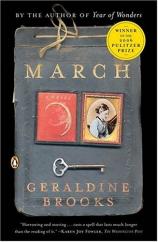March
Review
March
A friend of mine has a theory that you can tell a lot about someone from which of the Little Women she preferred. The trouble is, most people I know picked Jo. With her tomboyish ways and authorial ambitions, she was clearly a more thrilling model than Meg (too housewifely), Beth (too virtuous, and doomed besides), or Amy (vain and bratty). Still, for a lot of us avid readers, Marmee and her four girls were a profound early influence. Their struggles to make do, to be good, and to realize their dreams seemed contemporary to me in the 1950s, even though Louisa May Alcott's story took place almost 100 years earlier.
I never thought much about Mr. March. Perhaps the notion of an absent father and an all-female household resonated with an era when emotionally remote men went off to work and joined the family only intermittently, on weekends. Or perhaps it was just that this was almost entirely (and delightfully) a world in which males didn't yet count for much, which is certainly the way I felt before the age of 12. Despite the endearing Laurie, the helpful and ardent Mr. Brooke, and the avuncular Professor Baer, LITTLE WOMEN is not an equal-opportunity novel.
In MARCH, Geraldine Brooks redresses the balance, giving us a sensitive chaplain from Concord, Massachusetts, who volunteers for the Union cause and finds himself caught in the bitter carnage and wrecked ideals of the Civil War, finally ending up in a military hospital, whence Marmee (as readers of LITTLE WOMEN will remember) is summoned to nurse him back to life. In flashbacks, we learn the details of March's earlier life as a peddler in the antebellum South, a culture outwardly gracious and essentially cruel; his courtship of Marmee (who turns out to have been a hothead who Jo strongly resembles); and his anti-slavery activities and passion for educational reform. In fact, Brooks --- author of a stunning novel about the Black Plague, YEAR OF WONDERS --- based March's character explicitly on Louisa May's father, Bronson Alcott, just as Louisa May based her LITTLE WOMEN characters on her own family.
Bronson Alcott is the unsung Transcendentalist; his radical views were a major influence on Emerson and Thoreau, yet today he is known principally as the improvident father (he wasn't much of a breadwinner) of a famous children's novelist, writes Brooks in an essay for The New Yorker (January 10, 2005). Despite ill-fated projects such as the utopian community Fruitlands and a general tendency to let the purity of his principles sabotage any worldly success, Alcott held views remarkable for his time: He opposed corporal punishment in schools, believed in education through "conversations" rather than rote memorization, and supported women's suffrage.
Some of the most touching scenes in this novel involve education. When March is sent by the Union Army to start a school for freed slaves on a former plantation, he writes Marmee of his pupils: "We are so used to judge a man's mind by how lettered he is, yet here I have already seen that there are many other measures. With book-learning so long denied them, they have, perforce, cultivated diverse other skills. Their visual acuity is remarkable, and their memories prodigious." Although they have no ink or paper and must learn to write by scratching in the dirt with sticks, his students become devoted to March and watch over him when he contracts malaria; later in the story, they save his life.
But Brooks is appropriately wary of projecting our own 21st century version of moral enlightenment --- about race, gender, or class --- upon her characters: She is well aware that even the most progressive intellectuals of the 19th century had limitations. Consider, for example, March's remark that the ears of his "little women" should not be sullied with descriptions of the barbarous rapes and mutilations that take place under slavery; or Marmee's reaction to the unpalatably large number of impoverished Negroes ("Are there no end to the people?") in wartime Washington, D.C., quite unlike the "one or two colored citizens, carefully dressed and decorous in manner" that she is accustomed to seeing in Concord.
MARCH is beautifully written, cleverly conceived, and dramatically plotted; my one complaint is that the central figure doesn't entirely come alive. In her New Yorker piece, Brooks comments that Bronson Alcott, while possessing a "joyful, affectionate nature," was also guilty of "narcissism, moral certitude, and impractical idealism." Perhaps her diligent research created some inhibition when it came to building March's character, for there is a relentlessly self-righteous (and at the same time self-abnegating) strain in him that rouses impatience in the reader. You feel like saying, "Oh, get on with it!" MARCH is also a double love story --- the objects of his affection being Marmee and an elegant, highly educated former slave named Grace --- and I must confess that I found the women more interesting than the man.
In a neat twist, toward the end of the book Brooks abruptly shifts the point of view from Mr. to Mrs. March, and Marmee's character, taken out of the purely maternal role she plays in LITTLE WOMEN, is a revelation: courageous (she hid runaways as part of the Underground Railroad), given to losing her temper, and sexually eager. Her ambivalence about her flawed, visionary husband; her difficulty in adhering to the prescribed demure model of womanhood (March patronizingly refers to the "lawless, gypsy elements of her nature"); and her hopes for the girls (she refuses to punish Jo's outbursts, saying that "the world would crush her spirit soon enough") all found a response in me. I was sorry when the narration passed back to Mr. March. Despite Brooks's best efforts, women still insist on dominating this story.
Older children's books such as LITTLE WOMEN are like family heirlooms, handed down by generations. My mother and grandmother loved it, and Brooks, in her Afterword, thanks her own mother for suggesting that she read it. Too saintly? More than a bit sentimental? Maybe, but passionate and inspiring too, and the same can be said of MARCH. Thanks to Geraldine Brooks, the father of the "little women" is no longer faceless.
Reviewed by Kathy Weissman on January 7, 2011
March
- Publication Date: January 31, 2006
- Genres: Fiction, Historical Fiction
- Paperback: 304 pages
- Publisher: Penguin (Non-Classics)
- ISBN-10: 0143036661
- ISBN-13: 9780143036661










